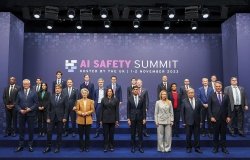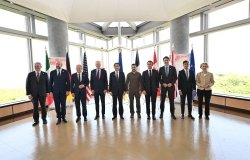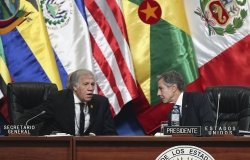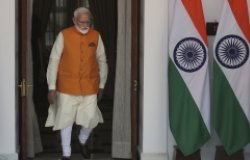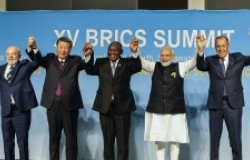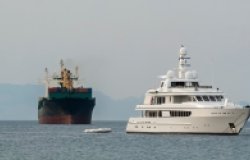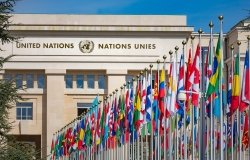The EU After the Lisbon Treaty
Following the ratification of the Lisbon Treaty last year, the European Union (EU) has initiated a series of decision-making and institutional reforms, including the creation of the External Action Service (EAS). Angelos Pangratis, Deputy Head of the European Commission Delegation in Washington, offered an informal progress report on how the EAS will be structured and the key areas of cooperation between the EU and the United States. He argued that the success of the EAS will be judged by its ability to produce concrete results in coordinating and implementing a comprehensive common foreign and security policy for the EU’s 27 members.
Overview
Following the ratification of the Lisbon Treaty last year, the European Union (EU) has initiated a series of decision-making and institutional reforms, including the creation of the External Action Service (EAS). Angelos Pangratis, Deputy Head of the European Commission Delegation in Washington, offered an informal progress report on how the EAS will be structured and the key areas of cooperation between the EU and the United States. He argued that the success of the EAS will be judged by its ability to produce concrete results in coordinating and implementing a comprehensive common foreign and security policy for the EU’s 27 members.
Pangratis praised the EAS for having completed a productive round of discussions in the first year following its formation. The EU’s existing 130 delegations worldwide and the EAS’s staff (comprised of diplomatic personnel from all member states) is headed by the High Representative for Foreign Affairs and Security Policy, Catherine Ashton. Although the EAS is institutionally independent, Pangratis explained, it works closely with the Commission and the Council. The EAS is divided into six departments, including relations with multilateral bodies, global affairs, budget and personnel, relations with accession and neighboring countries, relations with industrialized countries and relations with developing countries.
Already, the new institutional arrangements have given delegation heads a better sense of the EU’s commitment to its foreign policy mission and a greater sense of satisfaction from their role in it. Pangratis asserted that this is an extraordinary moment, since the establishment of the EAS reinforces the overall strength of the EU and the role that member states can play in world affairs. According to Pangratis, “the more we look into things that we can do, the more things we can do together,” to ensure the political stability of a “better and more functional EU.”
The current economic downturn presents a challenge to the developed world. Within the EU, member states have recognized that the way in which the euro zone currently operates has exacerbated the crisis in some countries. Euro zone countries could not respond to the ballooning debt crisis by devaluing their currencies, which left countries like Greece, with no alternative but to seek major internal adjustments such as decreasing state salaries and cutting welfare spending—which create more economic problems. While the Greek and Irish cases are making headlines, all of the euro zone members are susceptible to the same fate. Therefore, Pangratis explained, that these circumstances demand that the EU find ways to improve fiscal sustainability within the euro zone.
The Lisbon Treaty will have an impact on the Euro-Atlantic relationship, which Pangratis characterized as suffering from occasional conceptual misinterpretation on both sides. The complexity and novelty of the EU demands careful study and adaptation by both EU and U.S. diplomats. The stakes in the Euro-Atlantic relationship continue to be high, Pangratis asserted, since the United States and the EU share a number of fundamental challenges such as improving energy efficiency and enhancing energy security; preserving the environment; promoting technological advancement; and enhancing consumer protection. To address these issues, the EU and the United States need to recognize their shared interests and values. Diverging agendas, in Pangratis’s view, often present an impediment to attaining a higher level of coordination in EU-US relations. In an increasingly interdependent world, strengthening ties between developing countries has emerged as a priority on both sides of the Atlantic, thus creating favorable conditions for close-knit cooperation between Europe and the United States.
Drafted by Kristina Terzieva, Program Assistant and Nida Gelazis, Senior Associate, European StudiesChristian Ostermann, Director, European Studies
Speakers

Christian F. Ostermann
Woodrow Wilson Center
Angelos Pangratis
Hosted By

Global Europe Program
The Global Europe Program is focused on Europe’s capabilities, and how it engages on critical global issues. We investigate European approaches to critical global issues. We examine Europe’s relations with Russia and Eurasia, China and the Indo-Pacific, the Middle East and Africa. Our initiatives include “Ukraine in Europe” – an examination of what it will take to make Ukraine’s European future a reality. But we also examine the role of NATO, the European Union and the OSCE, Europe’s energy security, transatlantic trade disputes, and challenges to democracy. The Global Europe Program’s staff, scholars-in-residence, and Global Fellows participate in seminars, policy study groups, and international conferences to provide analytical recommendations to policy makers and the media. Read more

Cold War International History Project
The Cold War International History Project supports the full and prompt release of historical materials by governments on all sides of the Cold War. Through an award winning Digital Archive, the Project allows scholars, journalists, students, and the interested public to reassess the Cold War and its many contemporary legacies. It is part of the Wilson Center's History and Public Policy Program. Read more

History and Public Policy Program
The History and Public Policy Program makes public the primary source record of 20th and 21st century international history from repositories around the world, facilitates scholarship based on those records, and uses these materials to provide context for classroom, public, and policy debates on global affairs. Read more
Thank you for your interest in this event. Please send any feedback or questions to our Events staff.

